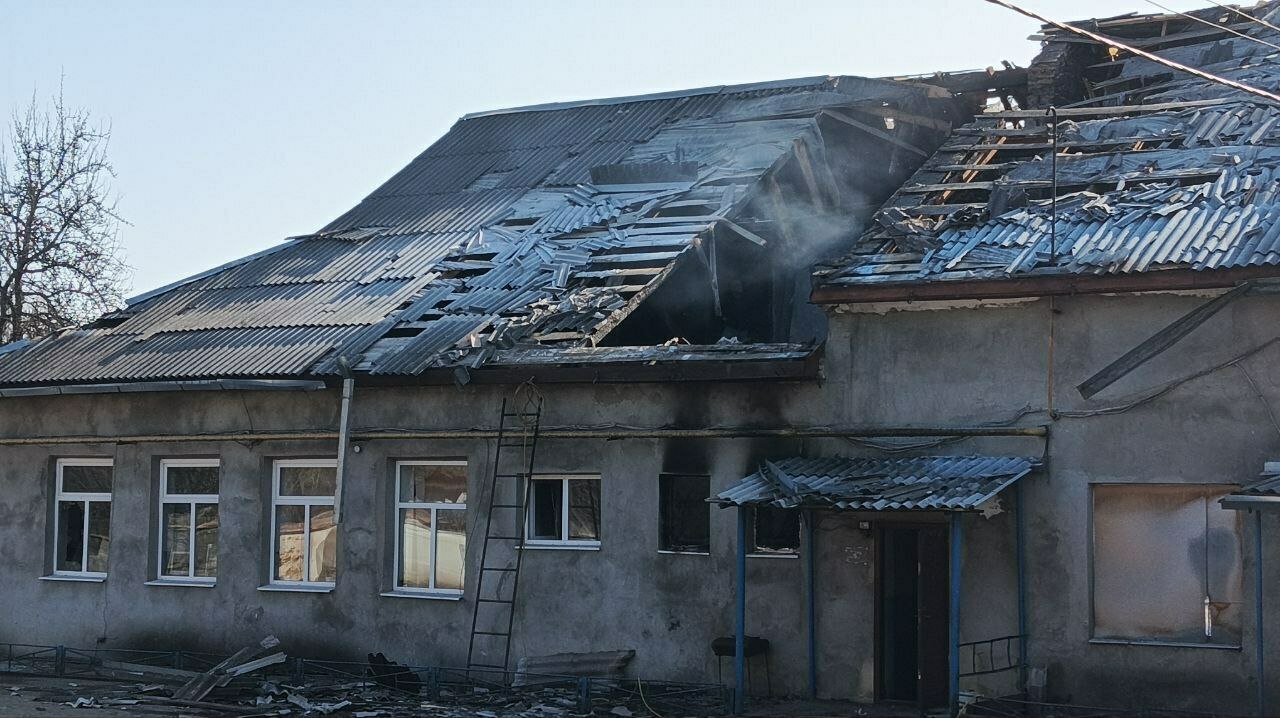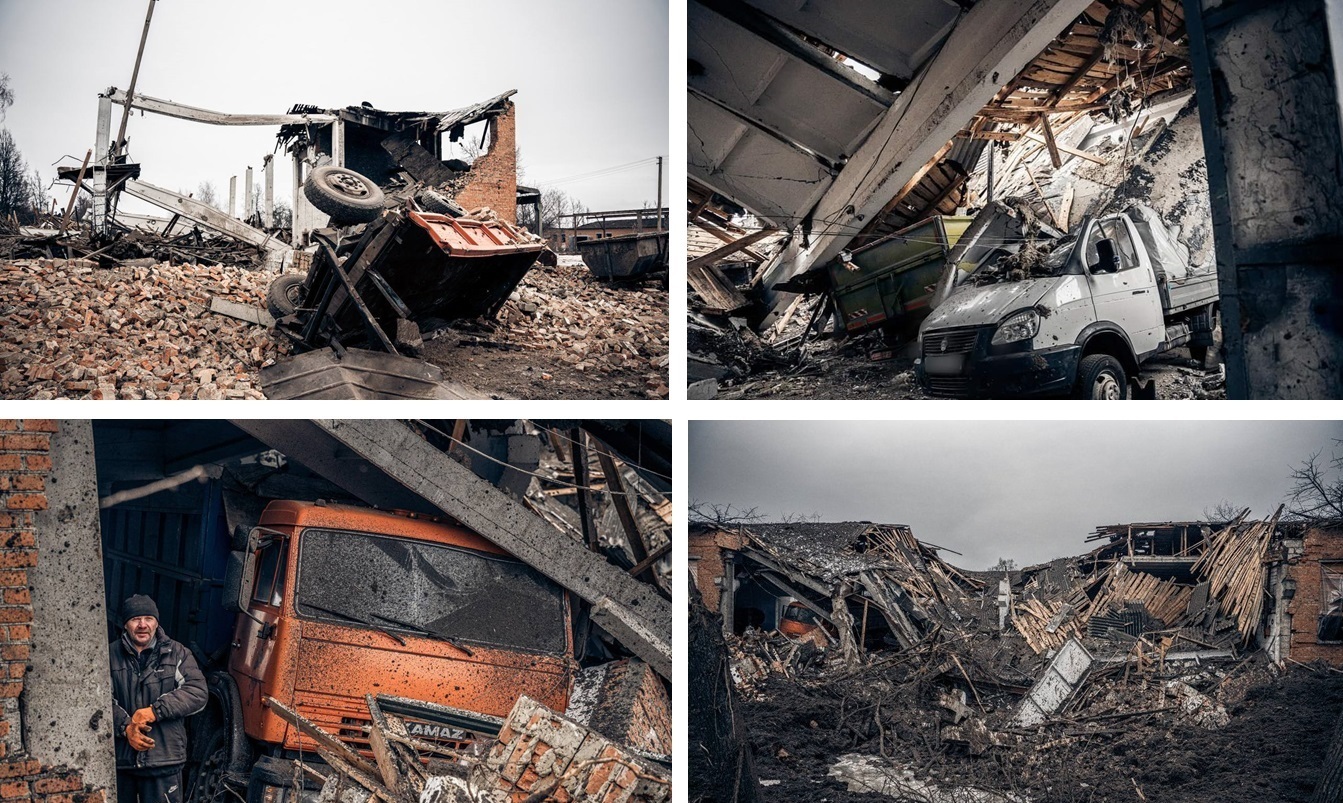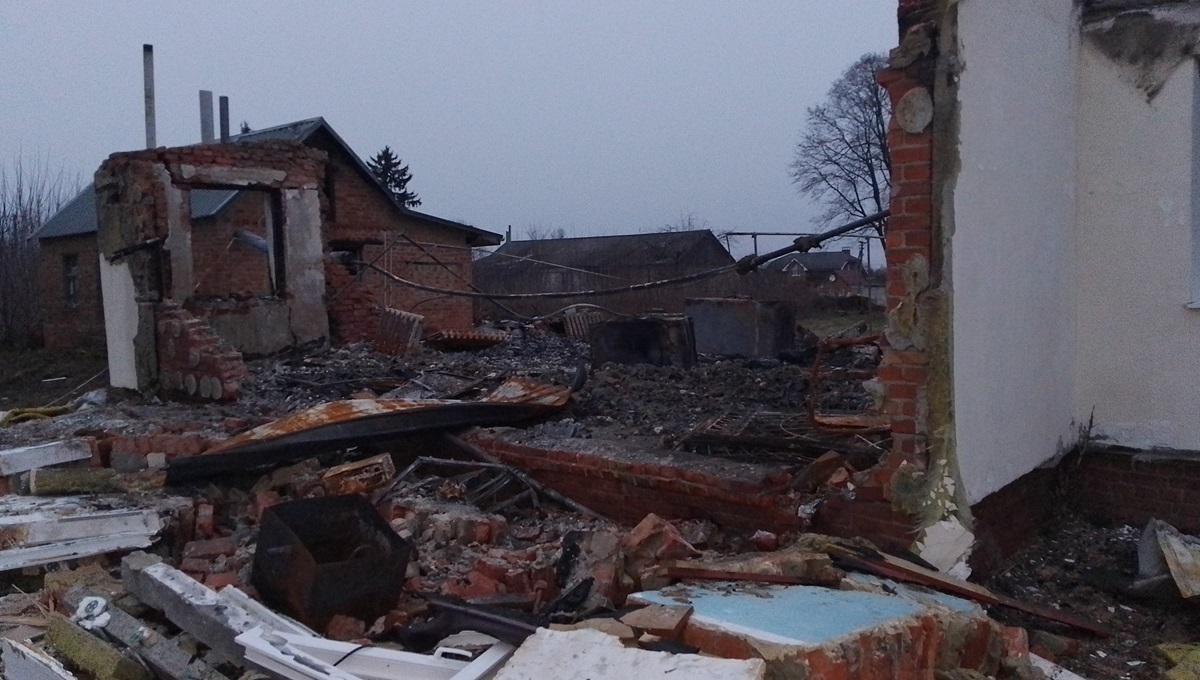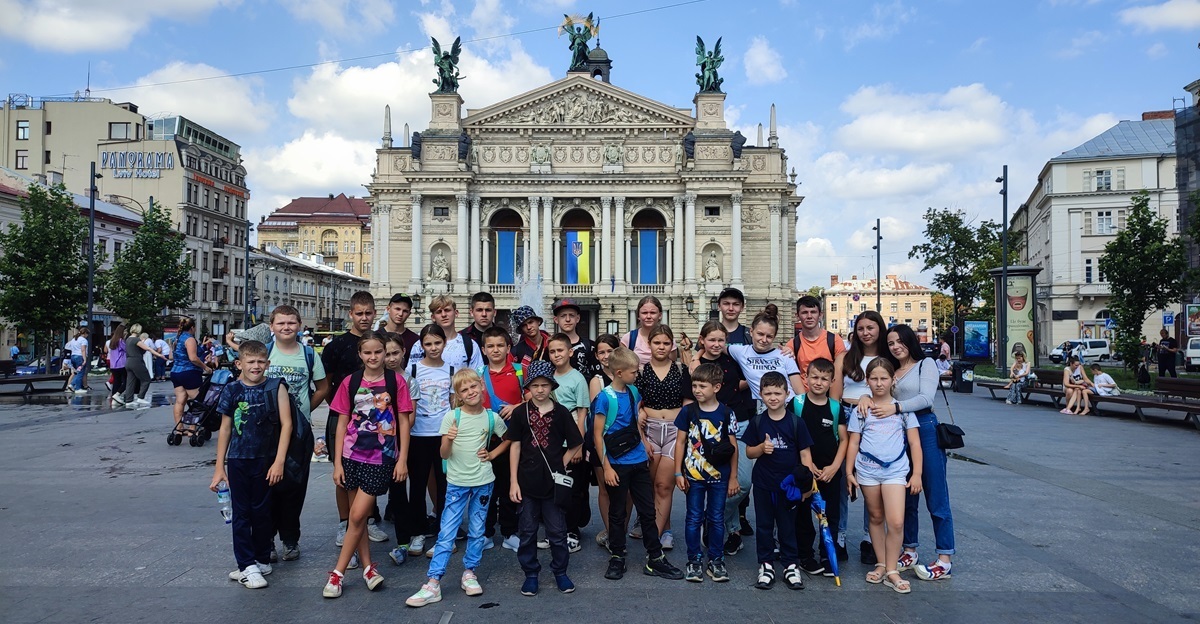‘You cannot imagine how we live here, because you have never seen anything like it...’ Interview with the head of a border community in the Sumy region
Mykola Torianyk, Head of the Khotin community in the Sumy region, which borders russia’s Sudzha district, had more questions than answers for the Decentralisation.gov.ua reporter. These included the reconstruction of destroyed buildings, the provision of services, support for the army, and the state’s care for the border areas. One thing that gives him confidence for the future is the Shoulder to Shoulder: Cohesive Communities National Project.
By Dmytro Syniak
For the residents of the Khotin community, there are two dates when the ‘real war’ began: 24 February 2022 and 6 August 2024. It was on 6 August that Ukrainian troops crossed the russian border – including into the Khotin community – and launched the so-called Sudzha operation, which continues to this day. The distance between Khotin to Sudzha is about 35 km, and until last August, life on the Ukrainian border was relatively calm: although enemy mines occasionally landed there, people got used to it and lived their normal lives. Now there is an endless stream of shells of every possible calibre, along with swarms of drones, guided bombs and even ballistic missiles. There are many dead and wounded among the locals. The once thriving community has barely a thousand inhabitants, a sixth of its former size. Mykola Torianyk, Head of the community, a tall, stocky man with a grey beard, turned his face away several times during our interview when he mentioned those who had died. But then he looked forward again: “We have to survive. For those who have gone. And for those who will return.” Amid the artillery fire, Mykola Torianyk spoke of the future of the community and the time when everything would be better.
What does the state plan to do in the border areas?
“Tell me, does the state have a plan for the border communities?” Mr Torianyk suddenly asks me, as if I am not interviewing him, but he is interviewing me. “Our neighbouring Yunakivka, Krasnopillia, Myropil, Bilopillia, Vorozhba, Velyka Pysarivka communities – all of them now live as if on a kind of island. Every day the russian army destroys everything that civilisation has brought us. The whole of Ukraine has one life, and here we have a completely different one: often without electricity, gas, heating, running water, internet, sewage... The state should have already told us what it wants to do here, how our communities will develop after the war. If the decision were taken now, we would start rebuilding as soon as the war was over. But we may well be told: ‘Dear friends! We do not need people on the border. It will be very dangerous here for decades to come. That is why there will be no schools or clubs here, just a wild steppe, just like it was three hundred years ago.’ I do not want to interfere with state policy, but we should know about this in advance, shouldn’t we?”
Mykola Torianyk was born in the village of Kindrativka, right on the border, and lived there for 58 years. Several generations of his ancestors are buried in the village. That is why he always treated his position as village mayor, which he took up in 2002, as a kind of mission, wanting to make the place where his ancestors have lived for centuries as modern and comfortable as possible. He has succeeded in many ways.
In 2005, Kindrativka was recognised as the best locality in Ukraine in the category of 500 to 1,000 inhabitants. Water was supplied free of charge to the residents, a sign of the wealth of the village council. The local budget was filled by dozens of businesses, including a large farm with breeding cows that produced 19 tonnes of top-quality milk every day. Kindrativka had an excellent school, a kindergarten, a new outpatient clinic, six stores, two cafes, and a gym. The Kindrativka football team was always ranked second in the district, and the volleyball team was first. The community centre had a folk choir.…
Wealth increased even more after the amalgamation into one community as a result of the reform of local self-government and territorial organisation of power. The budget of the amalgamated Khotin community for 2017, of which Mr Torianyk was elected as the head, was UAH 46 million (in addition to the Khotin settlement council, it included the Kindrativka and Oleksiivka village councils in the Sumy district). And at the beginning of 2022, the budget reached UAH 75 million in own revenues alone. The Favor plant alone, the only tin packaging manufacturer in Ukraine, paid UAH 7.5 million in personal income tax to the local budget each year. Now the company has moved to Zbarazh, Ternopil region, where it is building a new production facility. All the other businesses have closed down. The last to close was a bread factory, which was burnt down by russian shells just a few days ago. Not a single hectare of the community’s 15,000 hectares of arable land is currently being cultivated. And the biggest taxpayer is the Khotin settlement council itself.
Depopulated community
“russians have become very active now, and we are living under constant shelling,” continues Mykola Torianyk, “of the 14 localities in our community, 12 are situated within the 5-kilometre border zone. So, our main task now is to evacuate people. Fortunately, we have stocked up on fuel in advance. The Sumy Regional Military Administration, as well as various charitable and volunteer foundations, are helping us a lot with the evacuation: Prolisok, Wings of Ukraine, White Angels, and others. Many local people are leaving on their own – with their own transport or with the help of family and friends. Some of our villages are now deserted, while others have villages of 4 to 20 people. Most of them are pensioners who say: ‘I have lived here all my life and I will die here.’ What can you do with them? Of course, we explain the dangers, show them contracts with dormitories in Lebedyn and Sumy, but it has no effect. I understand them: no one wants to leave the property they have worked for all their lives. If, for example, you can theoretically take a television, you cannot take a fridge...”

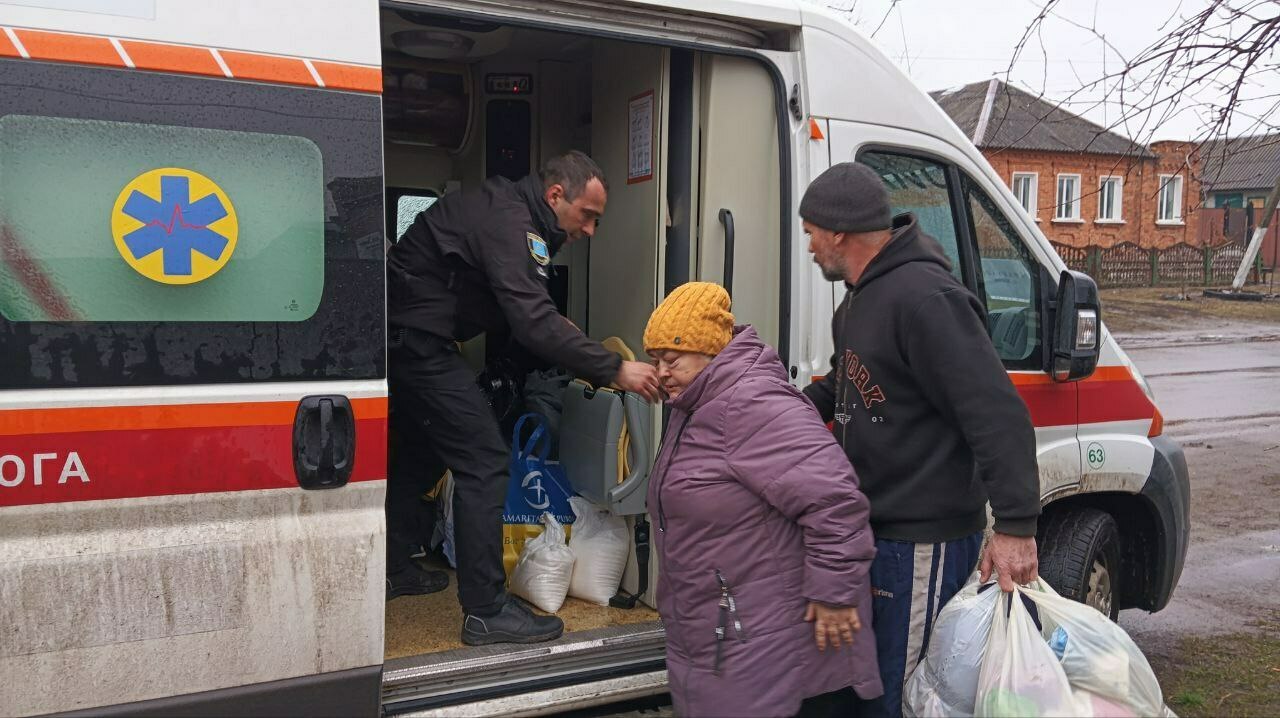
Evacuation of civilians in August 2024, after the launch of the Sudzha operation
Mr Torianyk is silent for a few seconds. Then he continues:
“The destruction is very extensive. At this rate, it will be a complete desert in a few more months. We are still repairing the most critical damage to infrastructure and private households, as people continue to live here, but it is very difficult given the shortage of construction materials and the complete absence of construction equipment. By the way, residents who left ask for repairs even more often than those who stayed: ‘Mr Torianyk, the neighbours say that my house has been hit by a missile. Please, at least cover the roof so that the water does not leak in. If the house is destroyed, where will we go back to?’ And often I have nothing to say. I want people to come back. All the workers in the public utilities sector are running around like crazy, sometimes coming up with incredible solutions to fix things. But we are not magicians...”
Khotin bread factory after the shelling on 08 March 2025
Aftermath of the missile attack on the Lan agricultural enterprise on 9 February 2024
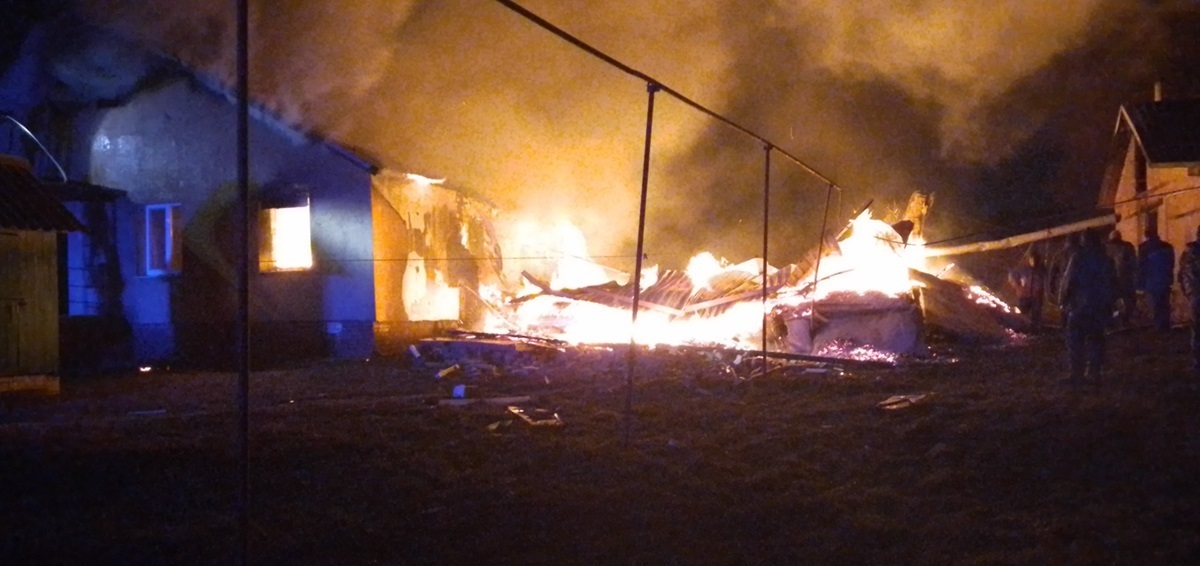
Outpatient clinic in Kindrativka village destroyed by russian artillery on 6 December 2023
Outside the window of the settlement council, the sound as if of thunder can be heard. It seems that somewhere far away a storm is roaring, slowly approaching Khotin. But Mykola Torianyk and I both know that, unfortunately, it is not a storm...
“Five people still work in our housing and utilities department,” he says, looking back at the blue and yellow flag hanging behind him, “they scaffold around the roof of a two- or three-storey apartment building to repair it, just like in the 19th century. There are 26 such buildings in our settlement. We need at least one crane! But it seems that the national government has given up on our community: they say, let the russians destroy whatever they want, and when the war is over, we will work something out. But people are still living here now! And the decision of those who want to return will be greatly influenced by the state of their property. I want people to come back, so I am repairing everything I can. For me, these are not just some houses on the russian border. This is my home! Mine and my fellow villagers!”
Mr Torianyk clenches his big fists and looks out of the window.
“Well, to heaven with them, with those houses. I have nothing to save people with! Sometimes they are trapped under the rubble of their own houses and we cannot get them out. We do not have the vehicles, and no one gives it to us. For example, any community in the Konotop district can obtain utility vehicles such as excavators and graders under various government programmes, but we cannot. This is because there is a direct government ban on the supply of certain assets to the 20-kilometre border zone. But how can we live without it, I am wondering?”
“But what if the russians burn the crane as soon as it arrives in your community?” I ask.
Mykola Torianyk lifts his head sharply and looks straight at me.
“Do you think we are unaware of this risk? Believe me, the years of full-scale war have taught us to take care of our vehicles. What we have here now is very carefully hidden away from the border. When needed, the vehicle arrives, does a quick job and then disappears.”
When utility vehicle is worth its weight in gold
“Should you look abroad for the right vehicles?” I suggest.
“By the way, we do. I would like to take this opportunity to thank our Norwegian friends and benefactors who donated an ambulance to us a few months ago. We now cherish it like the apple of an eye and have already saved many people with its help. Without it, how would you be able to transport to the rear territories someone who had had a stroke, for example, or someone with no legs who had stepped on a mine? We came into contact with the Norwegians through our links with the Lviv City Council, and the latter through its links with their Polish partners. Two years ago, I initiated the creation of the Lviv-Sumy Region Association, and here is the result...”
When I ask about participation in the Shoulder to Shoulder: Cohesive Communities National Project of the Ministry for Regional Development, Mr Torianyk brightens up.
“We are delighted with our involvement in this project, even though we have only been involved for a short time. Our partner, the Kryzhopil community in the Vinnytsia region, gave us an ambulance, which is literally worth its weight in gold to us. This is the best way to evacuate bedridden patients, the wounded, and those with limited mobility. Shoulder to Shoulder is an extremely useful project. I just wish it had been launched earlier, not two years ago. It would have been so much easier for us if we had had the shoulder of a partner like the Kryzhopil community all along! By the way, we are currently discussing sending about thirty of our children to the Lviv region at the expense of the Kryzhopil community. This is a very important matter for us, because now our children are separated from each other in the evacuation...
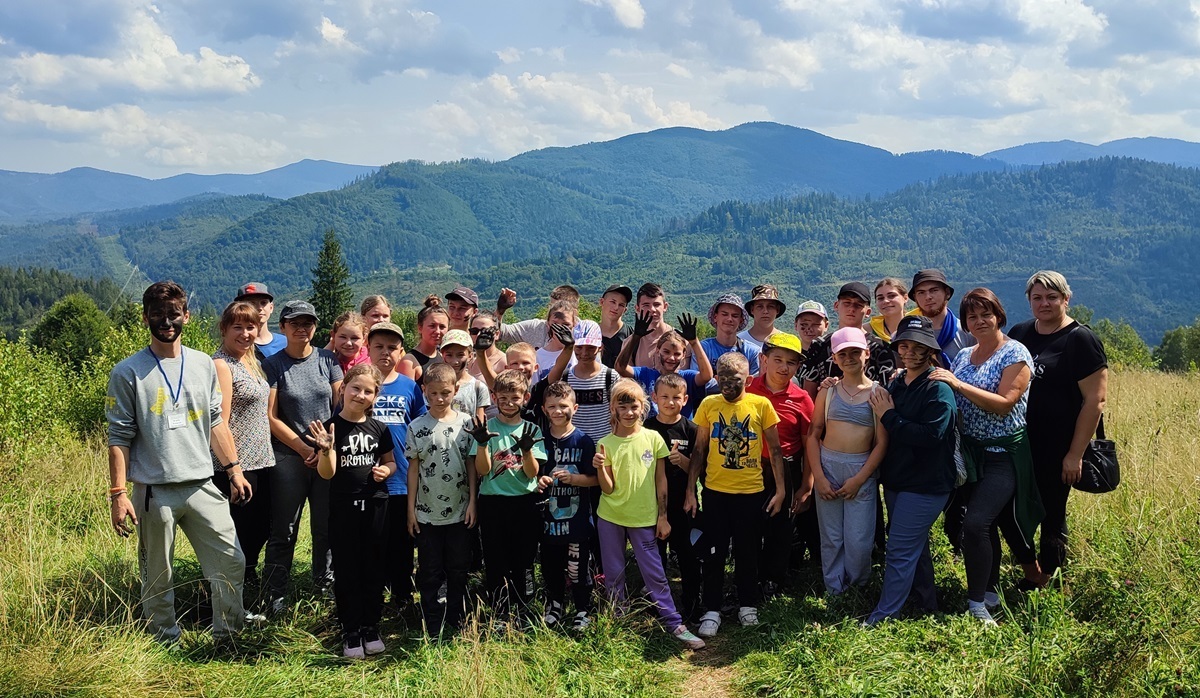
Recreation of children from the Khotin community in the Slavske community of the Lviv region, August 2023
Sightseeing in Lviv during the holidays in Slavske
Volodymyr Vasylyshen, Head of the Kryzhopil settlement council:
“We do not see our participation in the Shoulder to Shoulder: Cohesive Communities project as something special. It is our duty! At such a tough time, it is the duty of the rear communities to help the frontline and border communities. So, the Shoulder to Shoulder project is very timely. Mykola Torianyk said that sometimes his settlement council takes the wounded out on horseback. Can you imagine that? On horseback! Some time ago we received a special vehicle from the Kolo Charitable Foundation that can transport not only an injured person, but even a person in a coma. It was an ambulance. Transnistria is right next door to us: we thought anything could happen, so we took this vehicle. But we hardly ever used it. Instead, it came in handy for the Khotin community. We could easily accommodate up to 100 internally displaced persons from Khotin right now, if only they were willing to settle here – either in communal housing or in their own homes. There are many empty houses in our villages, and for UAH 20,000 you can easily buy one of them. We are also planning a summer holiday trip to Bukovel for thirty of our children and thirty of Khotin’s children. Let them meet and make friends! It is a good initiative. However, there is no legal support for it: formally, we have no right to allocate funds for the rehabilitation of children who are not from our community. So, it will be difficult for us to explain to the State Audit Service and other regulators that there are no strangers’ children, especially in times of war. But we will not give up on this project. Because now the Ukrainian communities have to stand shoulder to shoulder.”
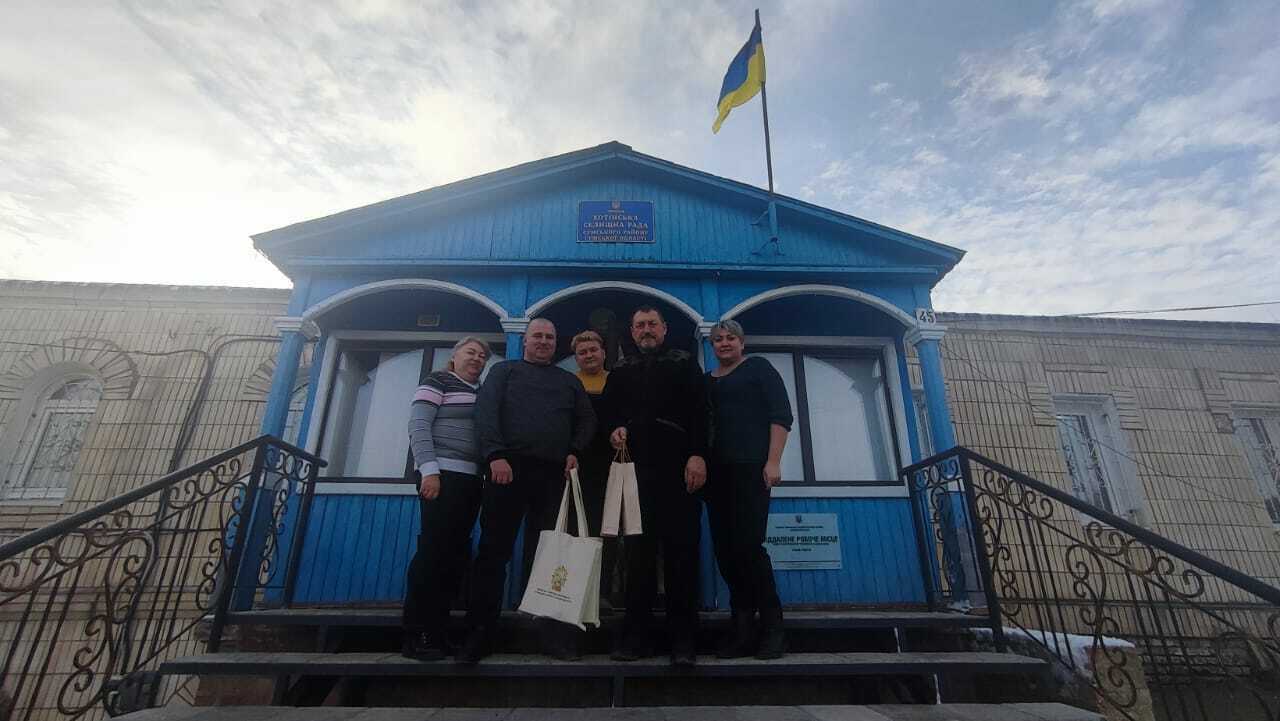
First visit of representatives from the Kryzhopil community to Khotin in January 2025
Speaking in more detail about his work within the Lviv-Sumy Region Association, Mr Torianyk mentions the so-called ‘relocation project’. About a year ago, Oleh Kotsovskyi, Head of the Khodoriv community in the Lviv region, offered him a large plot of land to build a town for IDPs. Mr Torianyk was very happy, because if they had managed to build such a town, the community’s population would not have been lost. One could say that the community was simply relocated to the Lviv region.
“It is much better than scattering people all over the world, isn’t it?” Mr Torianyk asks me again. “If there were similar government programmes, we would strengthen the Western communities and protect ourselves. After all, the danger from the russians will be a constant problem. If I were the state, I would not build housing for IDPs in Sumy, because Sumy itself remains under threat.
So far, there has been no government programme to build such a town in the Lviv region. One of the reasons for this has been the reluctance of Khotin community’s residents to leave their native Sumy region. Many of them have already received state certificates for their destroyed houses and have bought other houses – all in the Sumy region.”
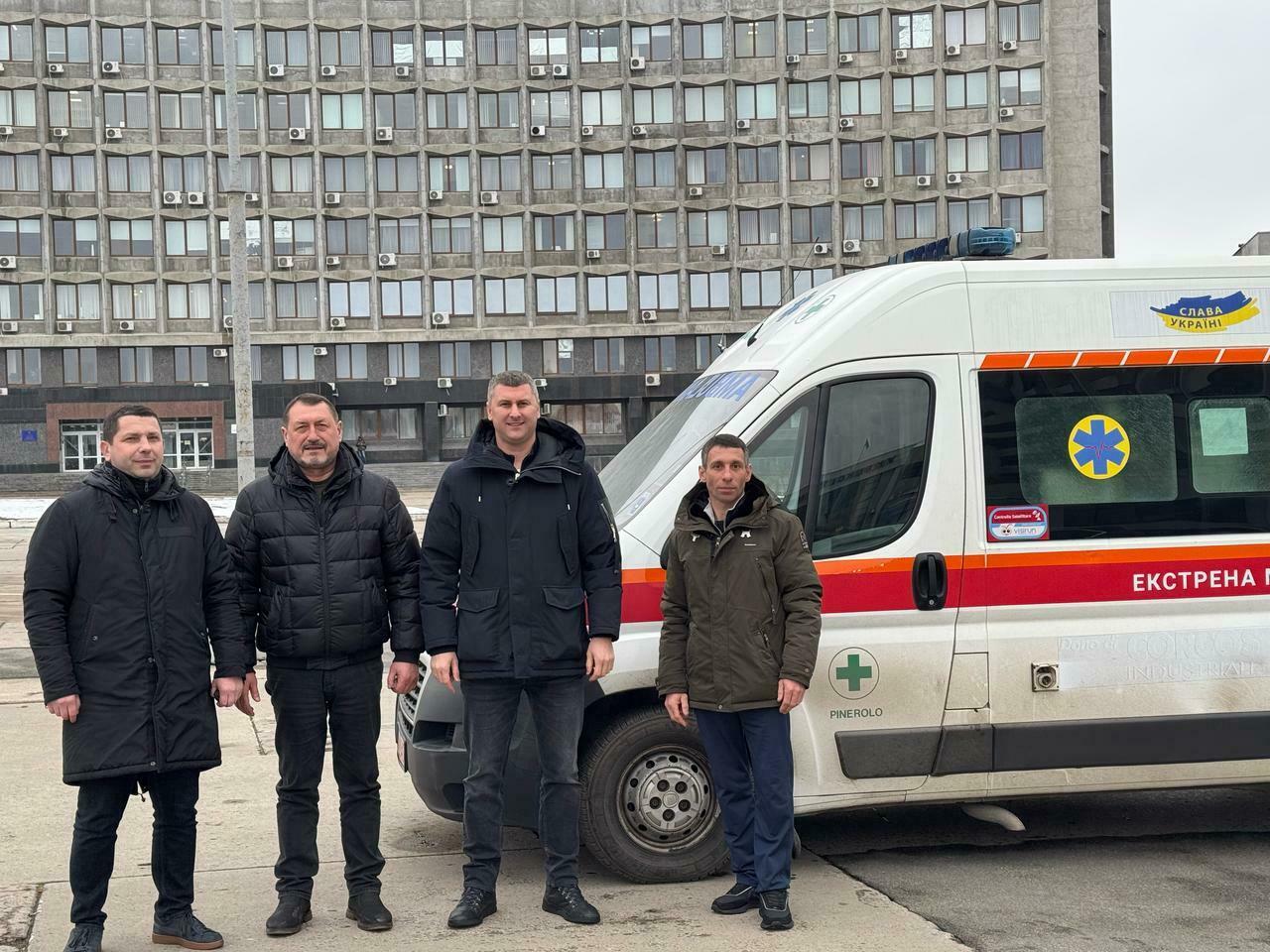
Visit of the Kryzhopil community to the Sumy region and delivery of a resuscitation vehicle to the Khotin community in March 2025
Life on the border
Out of UAH 17 million of Khotin community’s own revenues, UAH 6–8 million is spent on the healthcare sector. The head doctor of the local outpatient clinic has not left the community, and the family doctor and nurses are still there. But they no longer work in the clinic because it is too dangerous. Instead, the paramedics have given their phone numbers to people to call when they need their help. Similarly, if necessary, the paramedics go to emergency visits in the car of the settlement council. Mr Torianyk is convinced that this is the ideal format of work in the current circumstances. However, he asks a rhetorical question: Is it fair that the work of the paramedics, who often go to visit the patients under fire, should be evaluated in the same way as in the rear areas?
The same question applies to the local government staff. Apart from the head of the community, the only members of the settlement council’s staff in Khotin were the council’s secretary, the head of the social services centre, and two members of the commission for recording destruction. All the others moved to Sumy, where the settlement council had rented an office for them. However, this division did not affect their salaries.
The Khotin community considers the preservation of the teaching staff one of its achievements during the war, and plans to resume offline education after the war. But this hope is fading with each passing day. With no first-year schoolchildren to replace the school leavers, some are studying offline at schools in the towns and villages where they now live, while others go abroad. Before the full-scale invasion, the Khotin community had more than 400 schoolchildren, but now about half of them study online. All the schools are in ruins. The last miraculously surviving school was destroyed by an advanced russian Iskander-M ballistic missile two Fridays ago.
“It was our hub school, well-built, comfortable, beautiful,” Mr Torianyk recalls with pain in his voice, “we overhauled it at the expense of the State Fund for Regional Development in 2018. Now it is just a pile of gravel. And the russians hit the school in the village of Kindrativka with three guided aerial bombs. One of them did not explode and is still lying on the ground floor. The deminers say that it will not be possible to defuse it, it will have to be detonated. Together with the school.”

Khotin Hub Lyceum before 2022 and after 13 March 2025, when it was destroyed by russian missiles
Mr Torianyk looks back at the flag again and says:
“I still cannot understand: does the state need people on the border? If so, it would be good to think now about where to rebuild the school, what it should look like. And if not, we should at least dismiss the teachers. We are probably the only settlement council that continues to provide utility services on the border. And people even pay for them. But what we receive from the locals does not even cover a third of our expenses. So, I instructed our legal department to find out whether we have the right to cover all the people’s utility debts at the expense of the settlement council. Because people are no longer able to pay, it is obvious. And there is nowhere to pay physically: our post office has been closed for a long time...”
For a moment, I think Mr Torianyk is considering whether to tell me what has come to his mind, and finally he chooses to do so.
“You cannot even imagine how we are living here, because you have never seen anything like this! One day I get a phone call and someone shouts into the phone: ‘Mykola! Can’t you see our bread factory is on fire! Why isn’t anyone putting it out?’ And nobody is, because our fire brigade has been taken to Sumy, and nobody from there has been visiting us for a long time – neither firefighters nor rescuers from the State Emergency Service. No need to say anything! Even ambulances do not come to us. And the wounds people get from shelling are terrible! Thank God, the military help us. But they only give first aid. And then we put the wounded people – sometimes with broken bones – into ordinary cars, some of them lose consciousness from the pain... So, both the Norwegian ambulance and the resuscitation vehicle from the Kryzhopil community are very helpful. We are also currently negotiating with a German community to donate a fire engine. We have created a volunteer fire brigade. What is left for us to do? If this team also has a vehicle, it will be much easier to fight the fires caused by russian shells.”
“You said there were still about a thousand people in the community. How do they survive without stores and other ordinary comforts of civilisation?” I ask.
“We are not talking about stores! Some people have been living without electricity, communication and the Internet for six months!” Mr Torianyk gestures, “We gave them diesel generators, and we supply them with 20 litres of fuel every month. That is all the civilisation they have! And the way we deliver bread to some villages is like something out of a western. Once a week, a police officer wearing a bulletproof vest and driving a car equipped with electronic warfare equipment for 5 bands literally flies at high speed to some houses, throws out bags of bread and drives away. And then people cautiously come there and take the bread. We also deliver medicines to them in the same way. My deputy first collects their requests, buys the necessary medicines herself, and then the same police officer delivers the medicines to the villages in the same way... Despite the difficult conditions, most people do not want to leave. And sometimes, when they finally decide to leave, we cannot take them out. Just yesterday, the Wings of Ukraine volunteer group took seven people out of Oleksiivka, but were unable to take four more. Because russian drones were flying like crazy, they burnt several military vehicles on the road.”

Support for the population during power outages
About misuse of funds and land that will save the community
Mr Torianyk sighs deeply and makes it clear that the interview is over. However, it is clear that he has something else to say, but he is reluctant to talk about it with the journalist.
“Write, maybe it will reach someone in the government,” he finally decides. “Here at the border, we often feel oppressed, not only because we are denied vital vehicles and other things, but also because there is no proper legislation for us. As a result, there are already a number of criminal cases against local government officials working on the border. These cases are on hold now, but as soon as peace comes, the law enforcement agencies will chase the numbers as usual. Believe me, they will!”
“But why might you be prosecuted?”
“At least for misuse of funds. Some law enforcement officials have asked me why, for example, the utility companies are cutting down trees here and there. But when the military ask me for timber for fortifications, I cannot refuse! If I refuse to give this timber, the russians will come, cut down, burn, and destroy everything! When we win, we will plant new trees, new gardens... Everyone understands that I am doing the right thing and should not act otherwise, but no one has repealed the law: formally, a person is liable for an illegally cut tree. But while you can get off with a fine for a tree, you can go to jail for using electricity ‘in a particularly large quantity’ from a long-closed utility company.”
“And where does the electricity consumption come from?”
“Can’t you guess? You have dirty and tattered soldiers who come to you and their commander asks you to organise a laundry service for their clothes. He also asks you to organise a bath for the soldiers. So, first a washing machine, then a tumble dryer and other household appliances appear in a closed utility building. Electricity, water, and household chemicals are consumed. In addition, our utility vehicles dig and fill in whatever the military says 24/7. But according to the law, I have no right to do this. So, maybe it is time for the legislature to take care of me and people like me so that we do not feel like we are sitting on a ticking time bomb. What will we tell the prosecutors after the war? Where will we look for those commanders and those soldiers?”
Mr Torianyk’s speech becomes more and more emotional.
“We are often invited to various conferences. And so, we sit there with people from Zakarpattia, Lviv, Vinnytsia, Khmelnytskyi, Zhytomyr, and listen to their concepts for the development of tourism and educational space. And we have only one concept here: how to survive ourselves, and how to safely take out those who agree to do so. Can you feel the difference? Even those communities in the Sumy region that are located in the Romny or Konotop districts have completely different problems and prospects than we do. But at the legislative level, we are still no different from them. The head of a community in the Volyn region, for example, may refuse to help the military because he/she does not have the necessary resources or because his/her utility vehicles are simply busy. And I cannot say no, because I have russians only 10 kilometres away! If the military men and women do not stop them, my family, my colleagues, and I could die. And when these men and women ask for a drone, without which the defence may collapse, I buy it with the money I have. And I immediately get a call from law enforcement agency. But I am not buying it for the Wagner Group, I am buying it for my own Ukrainian military! Why doesn’t the state give me this right? You know, I am quite prepared to be imprisoned after the war. I just wonder how they will formulate the charges: helped the defenders of the Motherland?”
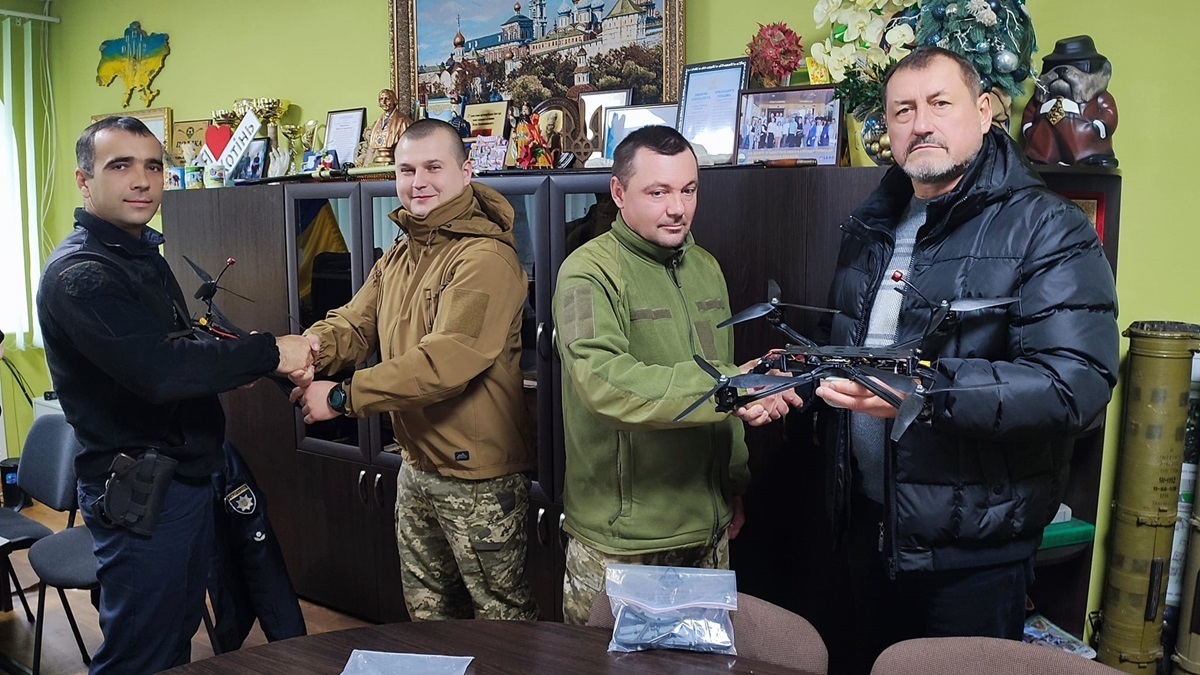
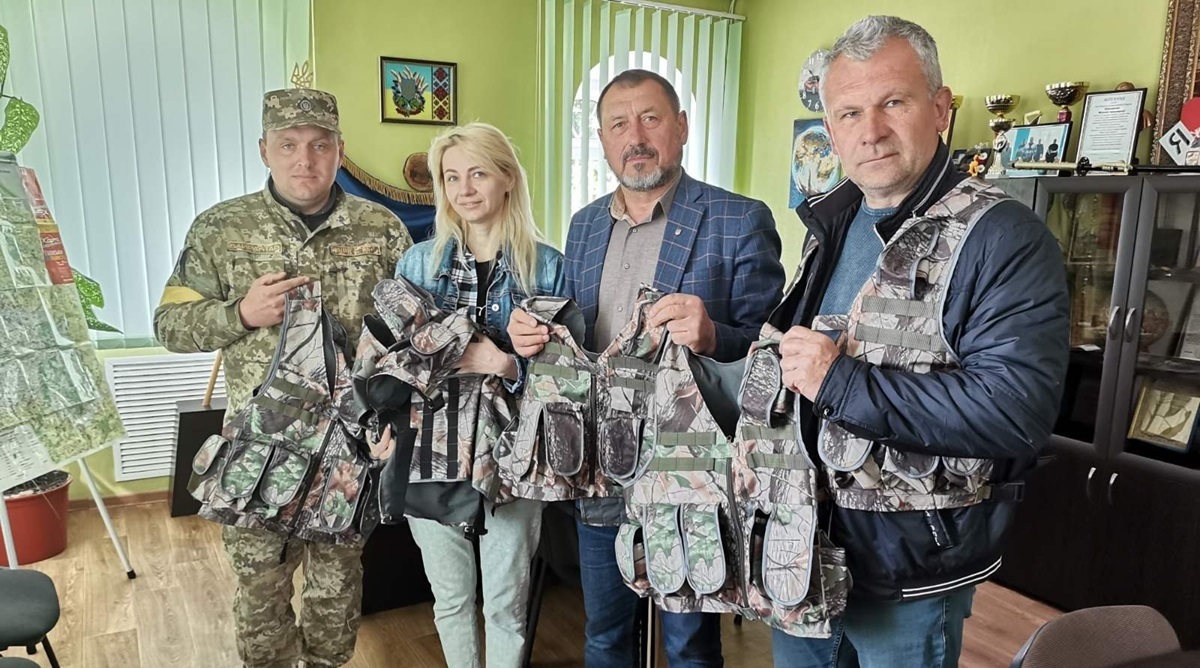
For residents of the Khotin community, support for the military is a vital necessity
“What about subventions?”
“When it comes to life and death, there is no time for these games, don’t you see? Nevertheless, last year the Armed Forces of Ukraine received almost UAH 10 million from us in subventions, which is 37% of our budget. And this year, our budget is UAH 17 million of our own revenues, but we have already allocated about UAH 3 million to the military, almost 20%. We usually work as a team with the military. Where do you think they go for help? To the settlement council! ‘Help! Give us a hand! Give us this and that!’”
“Do you think the Khotin community has a future?” I finally ask him.
Mr Torianyk’s eyes warm up.
“Although this is primarily a question for the state and not for me to answer, I will say that we have 15,000 hectares of extremely fertile land. This is powerful black soil – there is an agricultural term for it. The percentage of fertility of our land is between 80% and 94%. So, I am convinced that when the shooting stops, entrepreneurs will return to this land. They will not be stopped by the fact that most areas are densely mined. Everything will be cleared of mines, everything will be planted. And other businesses will follow, and infrastructure will begin to be rebuilt. We, the Ukrainians, are such people that our land cannot stand idle. My wife and I, for example, sowed garlic and onions in the autumn, and we will soon be harvesting them. This is despite the fact that our house is so close to the border that we can see the russian positions from it. We no longer live there, of course, and the house is badly damaged, but we look after the land. At the moment we are thinking about planting potatoes there. Of course, it is dangerous because there are a lot of russian drones around. But we will plant them anyway, as soon as we get the chance. This is the kind of people we are! We will live, because we know what gives life strength! And we will not give our land to the russians! Our children will grow up here, our heritage and our future will be here!”

Tags:
war stories report war stories special project
Область:
Сумська областьГромади:
Хотінська територіальна громадаSource:
Decentralization portal
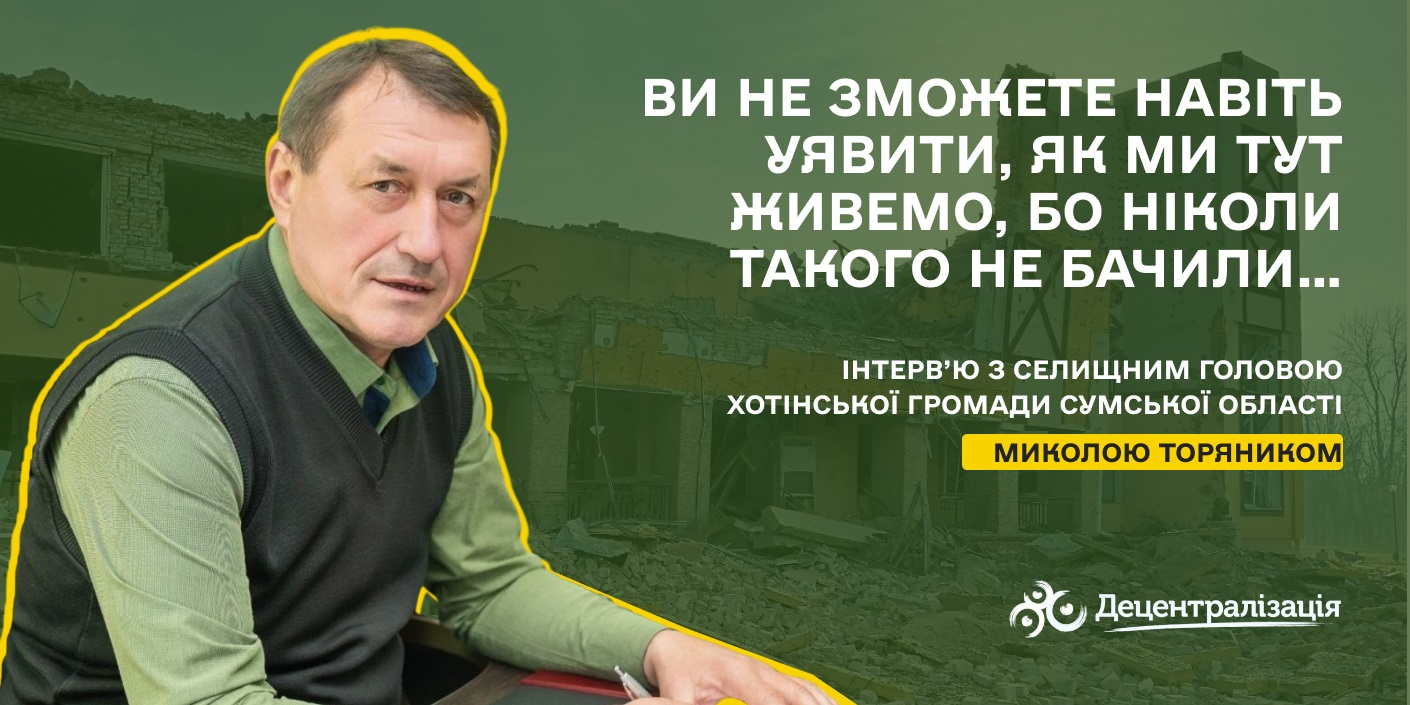
29 January 2026
Коли війна стає управлінським досвідом: виступ Миколи Різника на Конференції мерів США
Коли війна стає управлінським досвідом: виступ...
Війна змусила українські громади щодня ухвалювати управлінські рішення в умовах постійної кризи. Досвід, який...
28 January 2026
Швейцарсько-український проєкт DECIDE оголошує...
Громадська організація «Розвиток громадянських компетентностей в Україні» (далі – ГО «ДОККУ») у рамках впровадження...
28 January 2026
The 94th Winter Meeting of the U.S. Conference...
On 28 January 2026, the 94th Winter Meeting of the United States Conference of Mayors (USCM) commenced in Washington,...
28 January 2026
Protecting the capacity of local councils in small communities: Draft Law No. 14405
Protecting the capacity of local councils in...
Ukrainian MP Vitalii Bezgin announced the registration of Draft Law No. 14405 ‘On Ensuring the Authority of Local...
